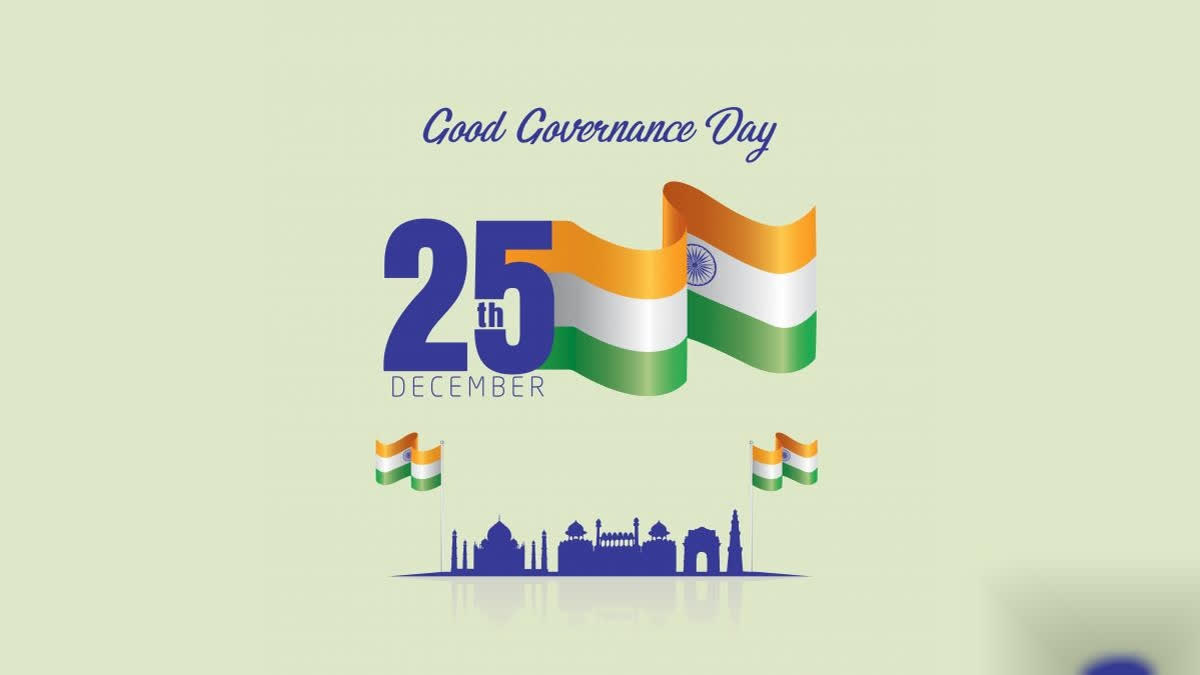New Delhi:Good Governance Day (Sushashan Diwas) is observed in India every year on December 25 to foster awareness about accountability in government. The day commemorates the birth anniversary of former Prime Minister late Atal Bihari Vajpayee.
History and Significance
The Good Governance Day was established in 2014 to honour Prime Minister late Atal Bihari Vajpayee.
On December 23, 2014, Vajpayee was announced as recipient of India’s highest civilian award Bharat Ratna for merit by then President Pranab Mukherjee. Following the announcement, the Narendra Modi-led central government announced that the birth anniversary of Vajpayee would be henceforth commemorated annually in India as Good Governance Day. This year marks the 99th Birth anniversary of Vajpayee.
Facts about Atal Bihari Vajpayee
Born on December 25, 1924 (Christmas day) in a Brahmin family. He is called the man of the masses. He was imprisoned for 23 days for participating in the Quit India Movement. Vajpayee was the only leader to win six Lok Sabha constituencies from 4 states including UP, MP, New Delhi and Gujarat. He was a Member of Parliament for 47 years -- elected 11 times from Lok Sabha and twice from Rajya Sabha.
Vajpayee served three terms as the prime minister of India, first for a term of 13 days in 1996, then for a period of 13 months from 1998 to 1999, followed by a full term from 1999 to 2004. He was the first-ever leader from the Bharatiya Janata Party to have become the nation's Prime Minister. He was the first Indian politician to deliver a speech in Hindi at the United Nations General Assembly.
During his tenure as PM, India conducted a successful nuclear test at Pokhran, Rajasthan, named Operation Shakti. Vajpayee never married and when he was asked the reason behind it, he said, "I stay so busy that I forgot. He has an adopted daughter, Namita. Vajpayee suffered a stroke in 2009 after which his speech and hand movement was impaired. He wrote his first poem when he was in class 10. Vajpayee even released 2 albums with Jagjit Singh featuring his poems: Nayi Disha (1999) and Samvedna(2002). Vajpayee was a close follower of Shyama Prasad Mukherjee, founder of the Bharatiya Jana Sangh. Vajpayee announced his retirement from politics at the end of 2005. In late December 2014, he was awarded the Bharat Ratna, India’s highest civilian honour.
He was once a communist. Before joining Rashtriya Swayamsevak Sangh, Vajpayee was slightly inclined towards ideas of communism .
Major Contributions Of Atal Bihari Vajpayee
Governance is the process of decision-making and the process by which decisions are implemented. In 1998 when Atal Bihari Vajpayee took over as Prime Minister, the telecom sector was monopolised. He took various steps to free up the sector and expand it. The NDA government under Vajpayee released the telecom policy of 1999. He unveiled the first moon exploration plan of India- Chandrayaan 1. In 2001, he launched Sarva Shiksha Abhiyan, a social scheme. For the first time in India, elementary education became free for children aged 6-14 years. Vajpayee made India a nuclear weapon state. In 1998, India conducted five nuclear tests in one week. The most ambitious road projects in India were launched by him, including the Golden Quadrilateral and the Pradhanmantri Gramin Sadak Yojna. As a PM, Vajpayee led India during Times of Crises like the Kargil War in 1999 and the terror attack on the Indian Parliament in 2001. Thereafter, Vajpayee initiated the Agra Summit in 2001, which was a pivotal moment in India-Pakistan relations. Vajpayee helmed privatisation in India with disinvestments in Bharat Aluminium Company (BALCO), Hindustan Zinc, Indian Petrochemicals Corruption Ltd. And VSNL. (Now TATA Communication). He also introduced the Fiscal Responsibility ACT which aimed to bring down the fiscal deficit. This boosted public sector savings which rose from -0.8% GDP in 2000 to 2.3% in 2005.
Indian Initiatives to improve Good Governance
Union Home Minister Amit Shah launched the pilot District Good Governance Index (DGGI) – a governance performance SOP – for Jammu & Kashmir. India’s first District Good Governance Index (DGGI) for Jammu & Kashmir has 58 governance performance indicators 116 data points spanning 10 governance sectors.
The Good Governance Index (GGI) has been launched by the Ministry of Personnel, Public Grievances & Pensions to determine the status of governance in the country. In addition, the National e-Governance Plan has the vision to “make all government services accessible to the common man in his locality, through common service delivery outlets and ensure efficiency, transparency & reliability of such services at affordable costs to realise the basic needs of the common man.”
